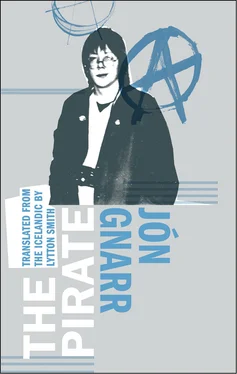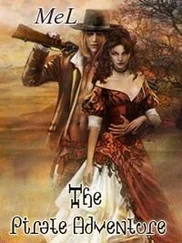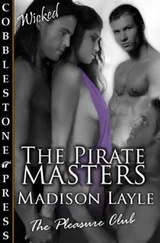Alli could play the guitar and even had an electric guitar his brother had given him. He’d also learned the violin for several years, so the guitar wasn’t that exotic as far as he was concerned. I didn’t know any musical instruments. I tried to write songs. It wasn’t easy. I didn’t really know how I was meant to word things when there wasn’t a tune. But the publicity materials were a cinch for me: anarchism, the school system, police, the peace struggle, and punk.
I tried becoming a drummer. We put together a drum kit in my room out of sweet tins, cans, pots, and pot lids. Alli played guitar, and I drummed with homemade wooden drumsticks. It went badly. I seemed to be completely devoid of any rhythm. Alli tried to explain the structure of music to me and how the drums were meant to supply the foundation for the rhythm but I didn’t know what he meant. He made me listen to all kinds of songs where I had to listen for a drum beat. I never heard any beat, just a series of noises. The sounds that came out of my kit were nothing like the sounds from a real drum kit.
“We’re missing a bass player, of course,” said Alli.
I realized that it was a little harder to play punk than I had thought. Alli suggested that I play bass since it was the easiest instrument to play. I liked the idea. Sid Vicious was the bassist. He knew nothing about his instrument when he started playing for the Sex Pistols. He was just hired because of his appearance, and so he was allowed to play the bass. Even so, he was the main man in the band, after Johnny Rotten. He was so much cooler and tougher than the guitarist. The bass is a simple instrument, much simpler than the guitar, just four strings and no frets. I went to see my friend Óli the Stud, who had just bought an expensive bass and had started playing in a dance band.
“Would you teach me to play bass?” I asked.
He was up for it, so we sat down and he showed me his bass, a handsome black Fender. He showed me how I should hold it and how to pluck the strings. Everything went great, and I quickly realized that the sound of the bass changed depending on where on the neck you pressed the strings. I was a natural and would definitely be playing like a chief in no time. Then Óli put a record on the turntable and told me to listen to the bass on the song and play along. I tried to listen but couldn’t hear anything no matter what I focused on. Óli tried to help me out with gestures and facial expressions. No luck. I just heard a jingling, like someone was shaking an iron tin full of screws. At first, Óli thought I was pulling his leg, but when he realized that I was serious, he said that I had to go to study music.
“You need to learn the basics of music.”
I was up for that. But what did it mean?
“Can I learn the bass?”
“No, I don’t think they teach bass anywhere.”
“But I just want to learn the bass.”
Óli stressed that I needed to learn the fundamentals of music and added that I should go to Óli Gaukur’s Guitar School. There, I’d get training in the basics and learn the guitar, and as soon as I’d mastered the basics of guitar I’d automatically be able to play bass. This sounded like a rather tortuous path, but since Óli said that it was the way, it probably was. I quite liked the idea and went straight home to my mother with my message.
“Can I go to Óli Gaukur’s Guitar School?”
“Why?”
“To learn the bass.”
Mom reacted pretty well to the idea and found it constructive that I wanted to learn something. So I got permission to enroll in a six-week course. My father took me to Rín, the musical instrument shop, to buy the cheapest acoustic guitar they had. I thought it was an ugly, stupid, hippie guitar. I had never seen a punk with an acoustic guitar. I was, however, willing to use it in private to practice and sat up all night inside my room and strummed on the guitar. I had no nails, so instead I used one of those plastic things they put round the necks of bread bags. I put my index finger flat across the strings, the way the guitarist in Crass did, and moved it up and down the neck while I struck the strings relentlessly with the plastic neck-tie. Perhaps this was the beginning of a phenomenal music career. Maybe I was about to become a world-famous punk guitarist.
I went to guitar school for the first time the next day. The students sat in a booth with headphones on their heads and electric guitars in their laps. Óli Gaukur walked among us, giving instruction. We all had to do the same song. He taught us a specific chord and made us practice it again and again until we knew it. Then he taught us another chord. I confused the chords with one another and found it extremely difficult to find the right place for my fingers. At the end of the session, he had us playing “Old Noah.” We didn’t use our nails, but we had to use our index fingers to strum the strings. I found it dead boring. I both found the chords difficult and the song pointless and annoying. Even worse, however, was that I hurt my fingers. I got a cramp in my hand from holding the neck tight and had sore fingertips from strumming the strings. I’d rather learn cross grip since that was more what punks used, and I asked Óli about cross grip. He said he didn’t teach any such thing and we would not need it if we learned real chords.
The second time was even more of a test than the first. Óli assumed everyone could do what we’d learned the first time around and had been diligently practicing at home. Most of the others clearly had practiced. However, I had no interest in this and had forgotten the chords. Óli tried to go over them with me while I informed him about the pointlessness of any kind of stupid chord when you just wanted to play in a punk band.
“To be able to play in a band, you have to know the instrument.”
I told him the importance of a person not knowing too much, and that a good guitarist could easily ruin a proper punk band and subsequently turn it into a New Wave band. Óli Gaukur had no interest in or sense of punk but nodded patiently, then tried to focus my attention back on the chords.
The third time, we were once again playing “Old Noah.” Each in their own booth. I didn’t. I nodded my head while he gave us instructions, but as soon as he turned away, I took the plastic piece and strummed the guitar. The sound that came through the headset was great. I closed my eyes and enjoyed strumming the strings. I strummed so hard that I snapped a string. Óli came over with a disappointed expression and took my headphones and guitar from me. When the session ended, he asked me to stay behind.
“Why are you here, Jón?” he asked, with a friendly tone.
“To learn to play the guitar.”
“Then why don’t you do the things I teach you?”
It was a good question. I, of course, hadn’t come to learn the guitar, but to learn the fundamentals of music and how I should play bass.
“I want to learn to play punk.”
“I don’t teach punk, Jón.”
That was incomprehensible to me.
“Why not?”
“I teach people to play traditional guitar, the important chords, so they can play popular songs.”
That was something I had no interest in. I was clearly in the wrong place. Chords and songs sounded about as exciting to me as long division and Danish. I was definitely not going to sit around a campfire with an acoustic guitar like an idiot, singing “My sweetheart, come to me.” I wasn’t going to sit in the kitchen and play “Old Noah” for Mom and Dad like some moron. I wasn’t a dork.
Óli suggested that I quit guitar school and even offered to repay me. We were both extremely happy with the outcome. My dad had already paid up front, so I could even pocket the cash. I told Mom and Dad, on the other hand, that everything was going extremely well in guitar school and that I’d become really good at guitar. Neither of them had any interest in it, and I knew they would never come and ask me to play for them.
Читать дальше











